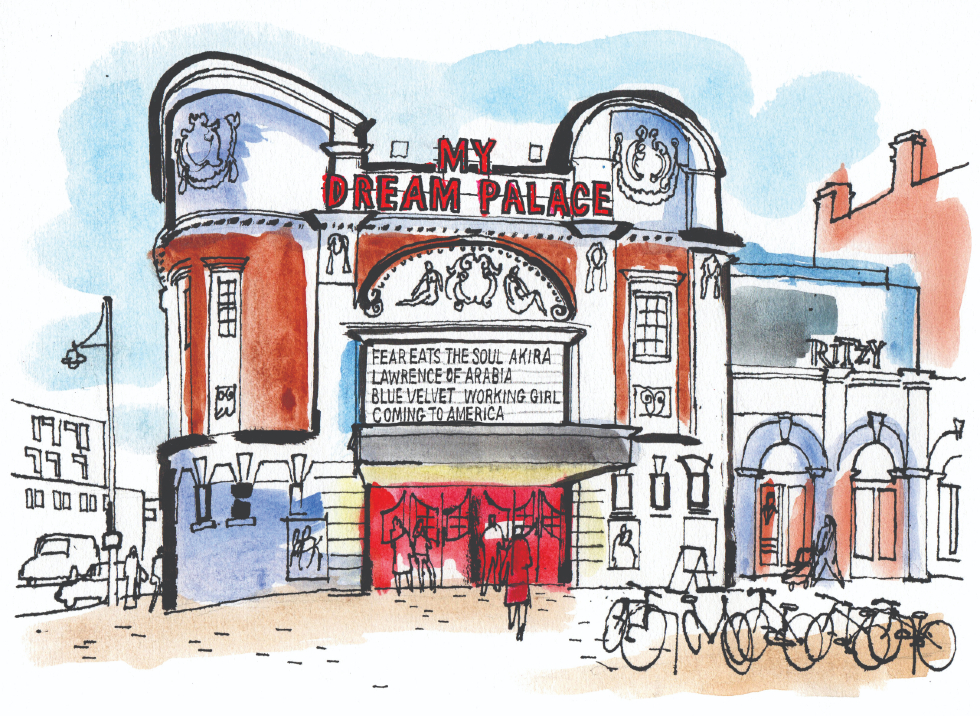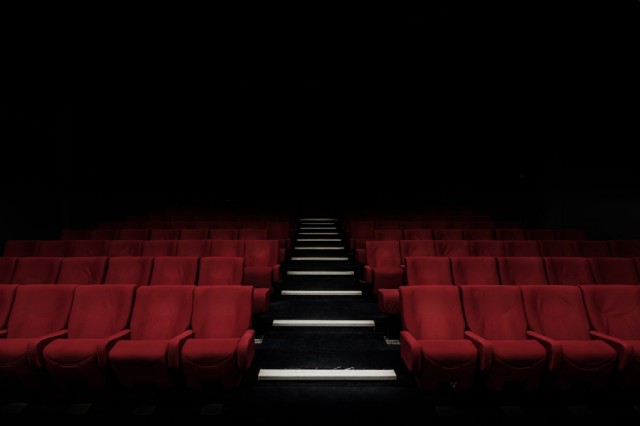“Going To The Cinema Is An Adventure” – Sight & Sound’s My Dream Palace

- Illustration by Lucinda Rogers
Something we really miss right now is going to the cinema. Celebrating that previously simple act is Sight & Sound magazine’s campaign, My Dream Palace. We caught up with production editor Isabel Stevens to talk about the film exhibition industry, her love for the big screen and how we can get involved…
Cast your mind back. What was the last film you saw at the cinema? When was that, exactly? For me it was in August last year, a month or so after it was declared, briefly, that cinemas could reopen in the UK (only to close once again a few short months later). While sitting down in front of a film remains one of the escapes – albeit fleeting – from the challenges we all currently face, for many of us, streaming a movie simply can’t compare to watching as part of an audience. It remains an event in a way that settling down on the couch never could be. With this in mind, we spoke with Sight & Sound magazine’s production editor Isabel Stevens about My Dream Palace: the publication’s campaign to celebrate cinemas.
The Double Negative: Tell us about My Dream Palace.
Isabel Stevens: My Dream Palace is an editorial campaign, celebrating cinemas and the magic of communal movie-going, that Sight & Sound started in November 2020. It grew out of a regular column we’ve run in the magazine since 2018 called Dream Palaces where a filmmaker spotlights a cinema they hold dear.
In November last year Edgar Wright launched the campaign taking readers on a tour of all his favourite cinemas and the formative experiences he had in them – from watching fantasy films in the late 70s in Bournemouth to social distanced screenings after the first lockdown. Since then many filmmakers from all over the world have taken part.
The lovely thing about their contributions is how varied they are – some transport you to streets full of ornate picture palaces that no longer exist (like Viggo Mortensen talking about Buenos Aires’s movie houses), others champion cinemas that are currently shut (Regina King on US theatre chain Alamo Drafthouse; Lynne Ramsay on the BFI Southbank or Francis Lee on the Hyde Park Picture House) or make you aware of cinephile hot spots to put on your future travel wish list (like Recife’s Cinema São Luiz that Brazilian director Kleber Mendonça Filho discusses). We even had Richard Linklater talk about how he set up a cinema (the Austin Film Society). Meanwhile other filmmakers speculate on what the future might bring for the big screen – but all of them agree that cinemas are the optimal environment for watching a film.
TDN: What initiated the campaign?
IS: The lockdowns that have happened all over the world; the fact that we can’t go and watch films all together in cinemas at the moment and we really miss that; the precarious state of the film exhibition industry right now and the fact that many cinemas around the world may not reopen unless they receive financial support.

TDN: What is it that makes the big screen experience so important?
IS: For me it’s an out of body experience of sorts that you just can’t get at home. As Wes Anderson says, it hypnotises you. I think Tilda Swinton put her finger on it in this poem she wrote for Sight & Sound (before we were even aware of Covid-19) where she praises ‘the wild wide screen’. Going to the cinema is an adventure.
It’s a roller coaster ride that you’re not in control of. And that sense of submission is really important – Lulu Wang talks about this in our next issue – to give yourself up to it and not be distracted is vital. It’s just like Susan Sontag writes in her 1996 essay, The Decay of Cinema, where she describes the experience of sitting in a cinema as akin to being kidnapped. That’s a perfect analogy in my opinion.
The darkness and the audience around you play a huge part too – it’s a singular mixture of feeling totally alone but also submersed in a crowd – and immersed in the drama on screen. There is nothing else quite like it.
TDN: The response from filmmakers has been impressive, with the likes of Wes Anderson, Lynne Ramsay and Regina King answering the call; that must have felt encouraging.
IS: Absolutely. So many filmmakers were keen to take part. There is a lot of love for the big screen out there. Filmmakers want to do their bit to support cinemas.
TDN: What is your own favourite and/or formative cinema?
IS: I have so many. It was mainly multiplexes when I was growing up – or at least the big chains. The Odeon in Guildford, Surrey. Later on, independent cinemas like the Phoenix and Picturehouse cinema in Exeter, Devon (where I went to University). Peckham Plex is my regular near where I live now in South East London. And of course the BFI Southbank – you can’t beat NFT1.
TDN: Are you worried about the immediate and long-term future for cinemas?
IS: Yes and no. I believe that the cinema experience is too singular to die out – and many filmmakers in the campaign believe this too. They are also too profitable for big studios to abandon completely in favour of streaming. I also think that when normal life returns, people won’t want to watch films at home in the same way they have been doing over the past year – there will be a lot of pent up demand for the collective movie-going experience. How much would you pay to go to the cinema with your friends right now?
I do worry about cinema-going becoming a more rarefied experience like theatre or opera – this is something that I talked with Chaitanya Tamhane, the Indian director of Court and The Disciple about. Also, in the UK, independent cinemas are getting a lot of support from Government schemes like the Culture Recovery Fund. But what about countries that don’t have schemes like this – what will happen to cinemas there? I do also think cinemas will adapt – they have faced many threats and seismic changes in the past, and they’ve survived.
TDN: How can we get involved and support cinemas at a time when we can’t visit them?
IS: If you can support your local cinema by buying a membership, giving gift cards as presents (including to yourself), watching films on their VOD platforms if they have them or donating to them when you watch a film online (through initiatives like Modern Films’ screenings that allow you to specify a cinema to donate some of the ticket price to). Many cinemas run film festivals that will still be taking place online – like BFI Flare: London LGBTIQ+ Film Festival coming up in March – and these are a great way to watch brilliant new films and alleviate the repetitive nature of lockdown life. And when cinemas reopen, if you feel safe doing so, do visit them. In the meantime, follow your local cinema on social media – and get involved with initiatives they run like online film clubs and so on. It’s interesting to see Home in Manchester, working with the local council and the Savannah Wisdom Foundation to launch a hardship fund to help local freelancers. Your local cinema is often a lot more than just a cinema. As Francis Lee says, it’s a community.
As told to Mike Pinnington
Isabel Stevens is the production editor of Sight & Sound, the international film magazine published by the BFI
To discover more about #MyDreamPalace visit: https://www.bfi.org.uk/sight-and-sound/my-dream-palace
Images, from top: illustration courtesy of Lucinda Rogers; empty cinema seats by Felix Mooneeram on Unsplash





